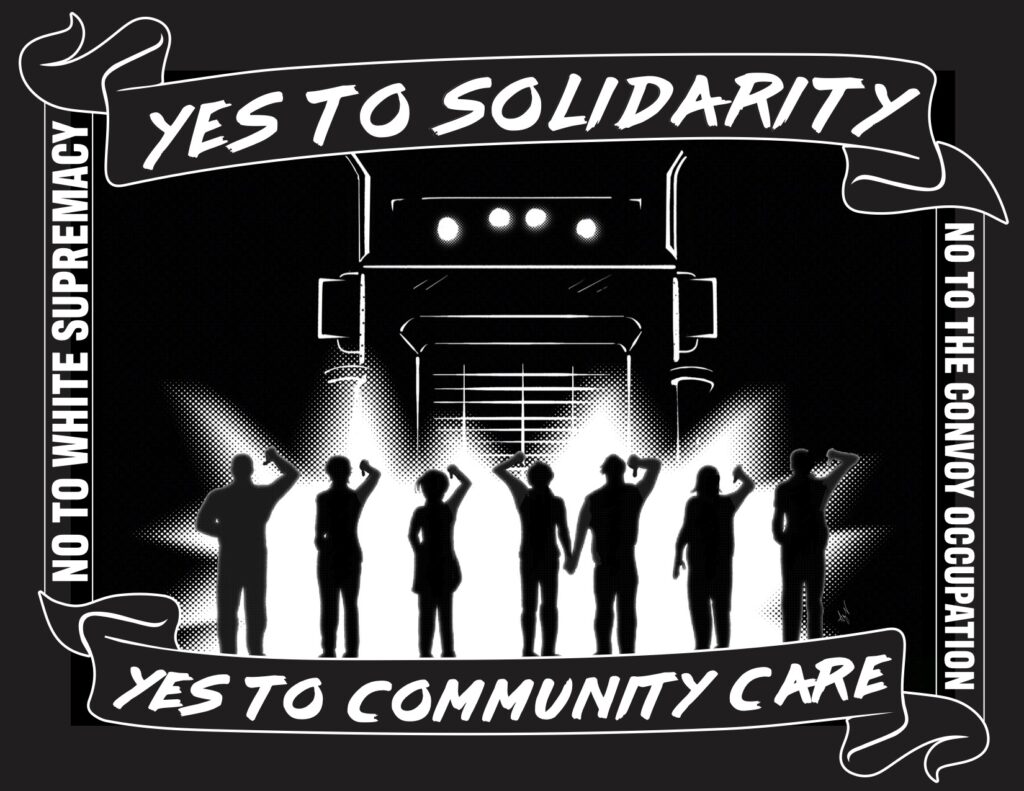(this is a plain-text version of what is up on The Leveller’s site, go there for graphics!)
Police misconduct and violence are increasingly dominating news headlines. With calls to disarm, defund, and abolish police forces, we’re also seeing inspiring efforts to fundamentally transform how people respond to harm and keep each other safe. For now, however, if you’ve been mistreated by the police in Ottawa, your main recourse is to file a complaint through established complaints procedures. These complaints are one of the few ways we can gain information about the problematic behaviour of cops and how the Ottawa Police Service (OPS) responds to such behaviour.
We have examined the last decade’s OPS reports. In reviewing them, we looked specifically at:
- the number of complaints received
- how the number of complaints has changed over time
- the nature of the complaints
- how complaints are dealt with
Our examination leads to two possible conclusions: either people in Ottawa regularly file frivolous complaints or the Ottawa police have a serious problem, not only with the conduct of their officers but also in failing to hold officers accountable in any real way.
Hundreds of complaints are filed against the OPS annually, yet the number of complaints that result in discipline is vanishingly small. Even as public complaints have increased in the last few years, the number of cases resulting in discipline has not increased significantly.
On top of this, the OPS employs various means and rhetorical tools to make this information difficult to access and understand, despite the requirement that complaint data be publicly available. In recent years, the OPS has also shifted towards informal mediation, which works to divert complaints away from possible discipline and further obscures the number of complaints filed.
How Does the Public Complaints Process Work?
All public complaints filed against any municipal, regional, or provincial police force in Ontario are overseen by the Office of the Independent Police Review Director (OIPRD). The OPIRD was created via provincial legislation in 2007 and began work in 2009. It is a civilian agency with a mandate to ensure “public complaints about police are dealt with in a manner that is transparent, effective and fair to both the public and the police,” according to their About Us page.
The complaint process begins with someone filling out a long form, detailing whether they have previously filed a complaint, whether the matter is already the subject of a Special Investigations Unit investigation, and whether the complaint is part of a criminal court proceeding. They then are asked to give details about which police service their complaint concerns, the officer(s) in question, what happened, and where. There is an extensive section for self-identifying by racial, ethnic, and religious group. All of this must be done within six months of whatever prompted the complaint.
The OIPRD has an extensive website, where they link to community groups they say can help with the complaints process and offer many explanatory documents about how to file a complaint. They offer to provide disability access, as well as options for regular and large print versions of a booklet with a tear-off complaint form.
Formal complaints have to be made in writing and cannot be anonymous. Everyone is asked whether they would “consider early resolution for this matter.” This isn’t explained. Complainants are not told that any complaints dealt with via early or local resolution are not considered official, and so may not be included in any significant way in the police force’s required annual complaint reporting.
The complaints process is by and large a tool in service of the Ottawa police, not a mechanism through which the public can hold them accountable
Once filed, the public complaint process is complicated, involving several oversight bodies and possible outcomes. A detailed breakdown of what happens after someone files a complaint can be found on their site. There are flow charts.
It is notable that the charted process for dealing with a complaint has ‘off ramps’ at every stage, where a complaint can be screened out or otherwise closed through disqualification, fiat, informal discipline, or resolution.
What happens after a complaint is filed?
All complaints, whether sent directly to the OIPRD or dropped off at a police station, are overseen, but not necessarily investigated, by the OIPRD. When the OIPRD receives a complaint, it takes the following initial steps
- Screening the complaint: The OIPRD examines the complaint and determines whether it meets initial criteria in order to be investigated. Complaints can be screened out for several reasons, including the OIPRD deciding they are frivolous or in bad faith. (The full list of reasons a complaint can be screened out can be found on an OIPRD webpage.)
- Forwarding the complaint: The OIPRD sends the complaint to the appropriate authority at the relevant police department, usually a professional standards department.
- Deciding who will investigate the complaint: The OIPRD decides if the police service who is being complained about or a different police force should investigate the complaint. Usually, the OIPRD assigns investigation of a complaint to the police service that is the subject of the complaint.
After a complaint has received some investigation, it is classified as “less serious” or “serious.”
“Less Serious” Conduct Complaints
Less serious conduct complaints include things like neglect of duty, failure to report a matter, and improper dress or appearance. These sorts of complaints usually result in informal resolution.
Informal resolution includes penalties such as:
- suspension of the officer with or without pay
- an apology by the officer or officers
- an explanation by a senior member of the police service or the OIPRD
- time off
- a requirement to undergo training
“Serious” Conduct Complaints
Serious complaints include things like discrimination, harassment, assault, or things that could result in a criminal charge. If the conduct complaint was determined to be both “serious” and substantiated, a disciplinary hearing is convened by the police chief with authority over the involved officers, to determine if discipline is required. The exact type and severity of any discipline is decided by the police chief and the police service based on the nature of the complaint. Possible disciplinary penalties include demotion or dismissal, suspension of pay, or suspension.
If there is evidence that an officer committed a crime, the case is referred back to the OIPRD for further investigation.
Appeals
We find it concerning that an individual who has filed a complaint against a police officer has little recourse to appeal the OIPRD’s decision — even if that decision is blatantly erroneous or biased. While a complainant can request the OIPRD review an investigation conducted by a local police force (if filed within 30 days), if the OIPRD conducted the investigation, the only option is to file for a judicial review by the Ontario Superior Court, a very daunting and lengthy task.
Examining the Numbers
According to OPS’ Annual Reports, people file hundreds of complaints against OPS officers every year. The last two years saw the biggest totals (442 in 2019 and 485 in 2020) since 2010. These complaints fall into two broad categories:
- public complaints, which are initiated outside the OPS by members of the public, and
- chief’s complaints, which are brought by a police or civilian member of OPS against another member of OPS.
In 2019, there were 230 public complaints and 212 chief’s complaints. In 2020, there were 285 public complaints and 200 chief’s complaints.
Prior to 2013, the PSS annual reports include only public complaints and they do not review chief’s complaints that resulted in some form of discipline. But looking at the reported numbers of all complaints since then, we can see some clear trends.
Most significantly, the number of public complaints that result in some form of discipline is vanishingly small — the highest number in the last decade was twelve in 2012 — and has been declining since 2013. The last reported year that a public complaint led to formal discipline for an OPS officer was 2015, incredibly, and there have only been two reported instances of a public complaint leading to informal discipline in the last three years.
Chief’s complaints resulting in formal discipline have also been declining since 2013. The highest number was seven in 2013. The last three years, taken together, have seen only one instance of a chief’s complaint leading to formal discipline — once again a tiny number.
However, the number of chief’s complaints resulting in informal discipline has grown significantly, especially in recent years. Prior to 2016, annual numbers for chief’s complaints leading to informal discipline were in the teens. Starting in 2017, however, there have been at least 46 chief’s complaints resulting in informal discipline each year.
What should we take from these numbers? First, public complaints against OPS officers consistently go nowhere. Of the 899 public complaints filed against OPS officers between 2017-2020, only two resulted in discipline of an officer. Second, there has been a marked tendency in the OPS over the last decade toward chief’s complaints resulting in informal discipline. In other words, the main way that OPS officers now face institutionally-mandated consequences for their misconduct is when other OPS members file complaints against them. And even in those circumstances, this overwhelmingly takes the form of informal discipline.
Rhetoric
It is instructive to examine how the OPS Professional Standards Section of the Annual Reports are made available and written. These reports are technically public, yet difficult to find. They are not listed prominently on any City of Ottawa or OPS website. (It is also not obvious that someone looking for information on complaints against the Ottawa police would need to look in the OPS annual reports in the first place!)
So an ordinary, concerned person would at the outset meet some difficulty in reading these public reports to learn about OPS complaints. (We got access to the reports from 2010 onward through a combination of online digging – they are available from 2012 onwards at the bottom of this OPS webpage — and requesting them through our city councillor’s office.)
Not only that, the PSS section of the reports, which house the yearly review of complaints, disciplinary actions, and criminal charges levied against police officers, seem designed to obscure and confuse — not to provide real information about what’s happening with the OPS.
There are several strategies these reports use to simultaneously acknowledge and discount complaints. For starters, they give only categorical information on the complaints, without naming any particular details about what actually happened.
This means that we can read how many “excessive force” complaints there were, but not if any were deemed as grounds for suspension or criminal investigation. We can see how many officers were investigated by the Special Investigations Unit and the general category of actions that would cause them to be so investigated, but not how many of those cases were for improper conduct. We can see how many mediations were attempted, but not what sorts of behaviours for which the complainants were seeking redress.
We know from many community organizations and individuals in our city that racism is a major factor when police hurt people. (We’ve traced a lot of this recent history in another article for The Leveller, “Not Our Friends: The Ottawa Police’s Long History of Violence and Racism.”) But these reports provide no data about race and racism. As a result, we cannot discern how police actions might disproportionately affect Black, Indigenous, and racialized people in Ottawa who make complaints.
This is particularly striking since the OIRPD is required under the 2017 Anti-Racism Act and under Ontario Regulation 267/18, as they say, to “collect race-based data on: 1) Indigenous identity, 2) race, 3) religion, and 4) ethnic origin.” Every person who makes a complaint is asked to provide this data. This information simply isn’t shared with the public.
Given that a number of complaints are marked as unresolved at each year’s end, there are plausible reasons for maintaining confidentiality for the duration of investigative work. But notably no “resolved” case ever has any explanation for what happened or who was involved. This makes it tremendously difficult for any member of the public to see if bad experiences we have with the OPS are similar to things other people have experienced, to know if particular officers are repeat offenders, or to know what disciplinary action they faced.
The reports rely on specific language and rhetorical moves that obscure the outcome of complaints. They also provide dubious justifications for why certain trends are occurring. First, the Office of the Independent Policy Review Director, which is supposed to investigate all complaints, in fact dismisses a large number of complaints as “frivolous, vexatious, over 6-month limit, or not in public interest.”
Now, perhaps there are frivolous and vexatious complaints. But the OIPRD never explains how they decide that something is frivolous, not in the public interest, nor why it is reasonable to expect people to make complaints about OPS behaviour before a six-month cut-off.
Second, the yearly reports consistently frame complaints in statistical terms, giving the number of complaints in proportion to the number of police officers. Every year, the reports say there has been “one” or “less than one” complaint per officer. This frames things as though it is reasonable to have any complaints and also does not tell the reader how those complaints are distributed amongst OPS officers. Are there complaints against every or nearly every officer in the Ottawa Police Service? Or are there a few officers with hundreds of complaints against them? This makes a difference, yet we have no way of knowing the answer.
Diverting Complaints through “Informal Resolution”
In addition to constructing the annual reports is a way that obscures important information and deflects responsibility, the way in which the OPS treats complaints lodged against their members is significant. One clear trend over the last decade is the OPS’ increasing emphasis on and use of informal resolution mechanisms.
These mechanisms range from informal conversations with individual police officers to more formal mediation processes. The OIPRD has particularly invested in mediation as a way to divert complainants into less-formal, less-tracked options. Practically, this means putting someone who has registered a complaint in a room for a conversation with the police officer they identify as having harmed them, along with a third party.
Starting in 2012, the OPS began using the same emphatically positive language to describe this in its Annual Reports: “Mediation allows the parties to share their perspectives of their interaction in a neutral setting and offers personal resolution to the complaint rather than the formal investigative process. Parties often feel better prepared to move forward with a positive attitude toward police as they feel they have been heard and have gained additional information and insight into police actions.”
OIPRD mediation programs have changed several times over the last decade, each time with great fanfare. In consultation with a research center at Carleton University, the OPS “enhanced” what was known as the “Voluntary Conflict Resolution Program” in 2010 to become the “Voluntary Alternative Dispute Program” (VADRP). In 2011, the OPS contracted the Canadian International Institute of Applied Negotiation to run the VADRP.
In 2013, the OPIRD launched two new mediation programs: “Mediation for Public Complaints Program” and “Customer Service Resolutions” (CSR). (Note that the CSR frames members of the public as “customers.”)
With a less clear mandate, the VADRP has continued but not grown significantly. The Mediation for Public Complaints Program “met difficulty in 2014” according to the 2015 report, though this goes unexplained. In 2017 and 2018, there was only one mediation attempt per year in this program, with the 2018 attempt reported as “unsuccessful”. Meanwhile, the CSR program has become the most-used of all the OPIRD mediation programs, diverting more than a dozen complaints each year.
While these approaches could be seen as beneficial in certain situations, for complaints raised by a member of the public against a police officer, there is a clear power dynamic that makes these forms of conflict resolution questionable. They also have the practical effect of reducing disciplinary procedures against police. In its 2015 report, for instance, OPS notes that “VADRP was also used to successfully mediate a public complaint which resulted in the disciplinary charges being withdrawn against three officers.”
Just as significant, these approaches erase complaints from the public record. As the 2018 report notes, “Successful mediations are documented as ‘resolved’ and are not included as a public complaint in the OIPRD and the OPS’s statistics.” That is, complaints that are resolved through mediation and informal resolution mechanisms are simply categorized as “withdrawn” or “resolved” and not otherwise included in OPS public reporting.
What does all this mean?
As we said at the outset, either people in Ottawa regularly file frivolous complaints or the Ottawa police have a serious problem. In analyzing the annual reports, our conclusion is clear: the complaints process is by and large a tool in service of the Ottawa police, not a mechanism through which the public can hold them accountable.
The flawed complaints process is merely one illustration of why addressing problems with the police using their methods is a dead end. The OPS ’ complaint process tangles complainants in bureaucratic undergrowth without making real change because their purpose is not really to serve the public.
The OPS have proven themselves unable, incapable, or unwilling to be held to account. Like the criminal “justice system” of which the police are a part, the complaints system cannot bring us real justice.
This is just one way to question the legitimacy of the OPS and whether they serve the public interest. We do not think that our main task should be to intensify the disciplinary proceedings aimed at bad cops. Calls for better policing usually only lead to further investments in policing.
To be clear, we do not think our goal as a community should be to increase investments in better complaints, mediation, and disciplinary systems. As a transitional demand, we believe the public deserves answers to the questions we’ve raised here about why abusive cops are never actually disciplined.
Starting with clearer communication and transparency is one step on the way towards holding police to account for their actions. A further step would be effective discipline, not bureaucratic smoke and mirrors. Real change, however, will only come through defunding, disarming, and abolishing the police.
Glossary & Abbreviations
Chief’s Complaint – A complaint brought by a police or civilian member of OPS against a member of OPS.
CSR – Customer Service Resolutions
Informal Discipline – Action taking by management to correct employee behaviour or conduct. It includes things like verbal warnings, coaching, and training
OIPRD – Office of the Independent Police Review Director
OPSB – Ottawa Police Services Board
OPS – Ottawa Police Service
PSS – Professional Standards Section of the OPS
Public Complaint – A complaint brought by a member of the public against a member of OPS.
SIU – Special Investigations Unit (the civilian oversight body responsible for investigating serious or potentially criminal actions by Ontario police officers)
VADRP – Voluntary Alternative Dispute Resolution Program

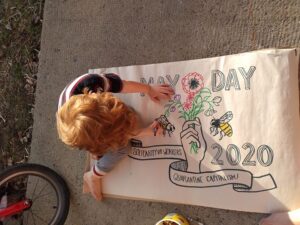 This year Punch Up Collective hosted our seventh contribution to recognizing May Day in Ottawa: a kid-centred picnic and short march. We wanted to share something about why this was so fun and to reflect a little on including kids and families in these kinds of celebrations, and the difference between including them and focusing events on kids and families.
This year Punch Up Collective hosted our seventh contribution to recognizing May Day in Ottawa: a kid-centred picnic and short march. We wanted to share something about why this was so fun and to reflect a little on including kids and families in these kinds of celebrations, and the difference between including them and focusing events on kids and families.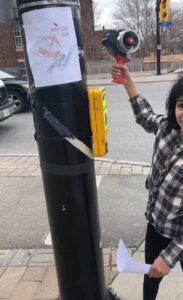 mal collective might look at this litany and decide that there just isn’t the need in the local radical left to have formal kid care available at our events generally and May Day in particular. 2020’s May Day was the first one under the shadow of the pandemic, and we instead doubled down on trying to do something with kids in mind: we paid a local artist friend to make
mal collective might look at this litany and decide that there just isn’t the need in the local radical left to have formal kid care available at our events generally and May Day in particular. 2020’s May Day was the first one under the shadow of the pandemic, and we instead doubled down on trying to do something with kids in mind: we paid a local artist friend to make 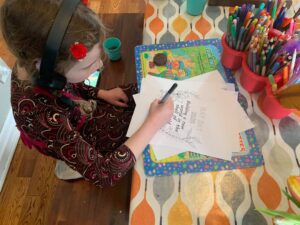
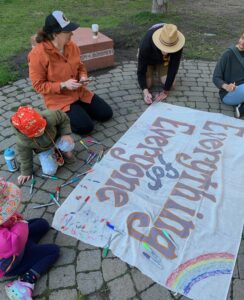 music to tell him maybe not to come. Luckily, he was biking over with his guitar, and so he missed our call, and thus was there when, bit by bit, a whole bunch of adults and kids showed up. Some people knew one another, many others didn’t know anyone. The kids got right down to work making drums out of buckets, shakers out of paper plates taped together with beans and grains inside, and decorating other noisemakers. Others drifted over to draw flowers, hearts, and other more mysterious things on our “Everything for Everyone” banner. People had snacks, and listened to a reading of
music to tell him maybe not to come. Luckily, he was biking over with his guitar, and so he missed our call, and thus was there when, bit by bit, a whole bunch of adults and kids showed up. Some people knew one another, many others didn’t know anyone. The kids got right down to work making drums out of buckets, shakers out of paper plates taped together with beans and grains inside, and decorating other noisemakers. Others drifted over to draw flowers, hearts, and other more mysterious things on our “Everything for Everyone” banner. People had snacks, and listened to a reading of 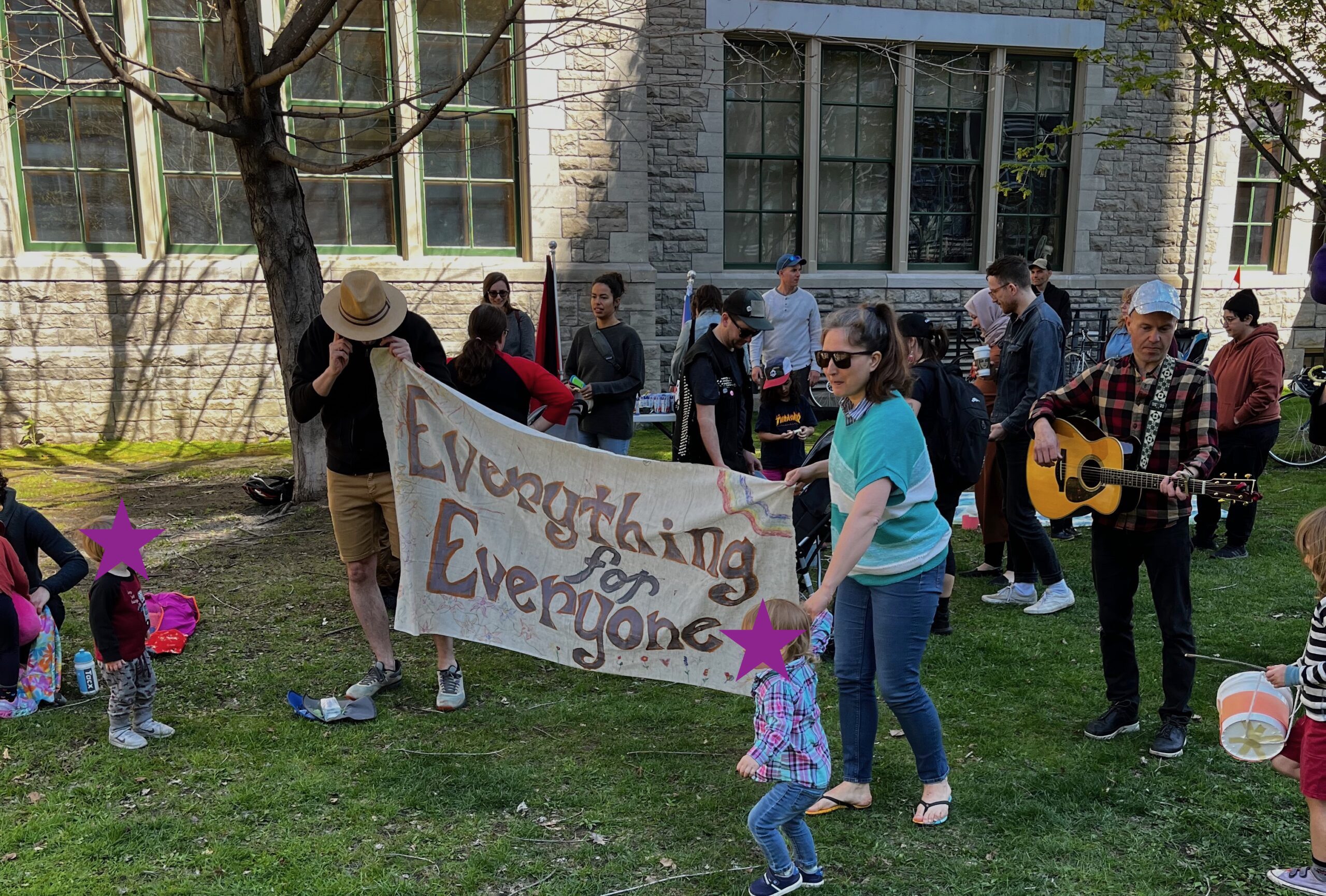 Although we’d invited people who aren’t parents or caregivers, mostly the people who came were pretty directly connected to the kids there in one way or another. Even though we reached out to parents we know, we didn’t connect with organizers in town like the folks working with Child Care Now, who are campaigning for universal publicly-funded childcare, nor did we reach out to our anarchist librarian friends who host kid-centred events in public spaces in Ottawa to see if they had ideas for activities leading up to the parade that might have brought in people we didn’t already know. In general, we were not thinking sufficiently strategically about the context in which we wanted to participate.
Although we’d invited people who aren’t parents or caregivers, mostly the people who came were pretty directly connected to the kids there in one way or another. Even though we reached out to parents we know, we didn’t connect with organizers in town like the folks working with Child Care Now, who are campaigning for universal publicly-funded childcare, nor did we reach out to our anarchist librarian friends who host kid-centred events in public spaces in Ottawa to see if they had ideas for activities leading up to the parade that might have brought in people we didn’t already know. In general, we were not thinking sufficiently strategically about the context in which we wanted to participate.
